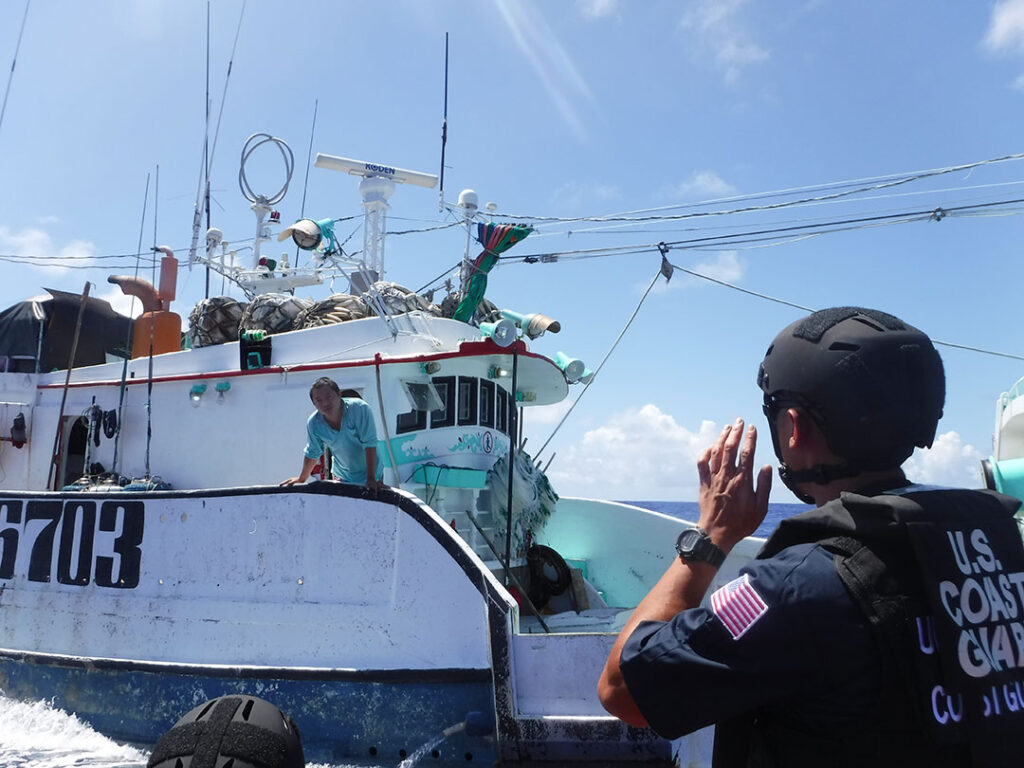NICK ADDE/SEAPOWER MAGAZINE
The ramifications of illegal, unreported and unregulated (IUU) fishing are readily apparent to nations whose economies depend on fishing, but the practice also affects the United States’ national security, a panel of experts said August 4 at Sea-Air-Space 2021. The discussion was part of the global maritime exposition sponsored by the Navy League of the United States in National Harbor, Maryland.
Whitley Saumweber, who directs the Stephenson Ocean Security Project, described a situation in which 90% of the world’s fish stocks are overfished while demand continues to increase.
“This combines with increasing global competition, particularly from China, which uses its fishing fleets both as a source of economic and food security but also as a way to project soft power on the globe,” said Saumweber, the panel’s moderator.
U.S. Coast Guard Vice Commandant Adm. Linda Fagan said illegal fishing is replacing piracy as the top global maritime security threat facing the nation. “It’s a sovereignty issue, it’s a maritime security issue, and it jeopardizes nations’ economic food security,” Fagan said. “It weakens the global rules-based order that we all rely on for our standard of living.”
Tackling IUU fishing, Fagan said, will require experienced leadership and close collaboration in building new partnerships and fostering existing ones around the globe.
“We recently had the Mohawk, a 270-foot cutter, with another nation’s coast guard on board enforcing fisheries rules,” Fagan said. “It’s those types of partnerships where we provide an asset and the other nation provides their expertise and authority to get after the threat.” (Pictured: A boarding team from the U.S. Coast Guard Cutter Sequoia approaches a vessel in the Pacific Ocean in joint operations with the Thailand government to combat illegal, unreported and unregulated fishing.)
U.S. Navy Rear Adm. Heidi Berg, the former J2 director at U.S. Africa Command, said IUU fishing drew considerable attention during her tenure because of the challenges it created in other areas. She cited the effects of the People’s Republic of China’s (PRC’s) growing presence and activity.
“In the Gulf of Guinea, [the PRC] is now devasting those economies,” Berg said. “They engender corruption. They continue to act to support authoritarian regimes that can ensure their continued access.”
Other crimes, such as weapons and drug trafficking, are increasing as a result, Berg said. Terrorist organizations such as al-Qaida and the Taliban are gaining influence as well, she added.
Constance Arvis, the acting U.S. deputy secretary of state for oceans, fisheries and polar affairs, said the U.S. State Department is working with other agencies and 69 international partners on a groundbreaking treaty called the Port State Measures Agreement.
“We are seeking to build a clean value chain of seafood that only accepts authorized catch from authorized vessels,” Arvis said. “If a port state believes that a vessel that wishes to come in has in fact engaged in IUU fishing, it can be denied port services and entry. Information is going to be shared with other ports to make clear that no IUU fishing enters the international market.”
The U.S. Defense Department’s Defense Innovation Unit is seeking ideas from academia, government and industry on how new technologies such as artificial intelligence (AI) and machine learning could enhance enforcement of fishing regulations and quash IUU fishing.
“We have no pride in where the solution comes from. But it is critical that when we get things to work, we find out [if] we can use the types of data here — space-based SAR [synthetic aperture radar] — to accurately identify activity that’s indicative of IUU fishing and vessels that may be doing it,” said Jared Dunnmon, the unit’s director of AI.
IMAGE CREDIT: U.S. COAST GUARD

